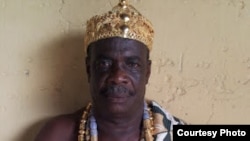Africa's long history is filled with narratives of powerful chiefs who ruled large and small kingdoms. Many traditions of power remain, though they are somewhat reduced in the evolving politics of nation states. In central Ghana one man guides the good behavior of 800 neighbors.
Here is one in a series of articles about some of modern Africa's traditional rulers.
Awutu Akropong is a serene village tucked in the thick foliage and rolling hills of the Senya District of Ghana’s central region and home to about 800 Ghanaians.
Nai Efisa Dankwah is the village’s traditional ruler. He is 66 years old and has held the powers of this traditional office for more than 30 years. He served under community elders for several years prior to his 1984 inauguration as chief. He has no formal education. He likes to say he was schooled in best practices in public behavior.
For decades under their British colonial rulers, traditional authorities such as Nai Afisa Dankwah played significant roles in ruling the county under British colonial rule. With independence and popular participation in national and regional governance, Ghana’s traditional chiefs struggle to evolve their roles as rulers. Nai Afisa Dankwah is striving to maintain his relevance to the people of his village.
“I learnt how to relate with both single and married women,” he says. “For example, there was need to ensure the presence of my linguist anytime I dealt with an unmarried woman.
“I also needed to avoid being influenced through bribery. I was told I could lose my position as chief if I engaged in any criminal activity.”
He is the law night and day
Effective administration of the village includes respects for local taboos. For instance, the pounding of fufu, a local Ghanaian dish, is forbidden at night. Carrying freshly harvested palm bunches to the village is prohibited. Also, women are not allowed to go near water bodies during their menses. It is equally an offense to beat drums or play loud music 21 days before celebration of Awutu Wubea, the annual festival of the harvest of local crops.
The list of regulations he enforces is long, but it is not an infringement of the right of the people, says John Larbie, who lives in the neighboring village of Awutu-Ofaakor. Larbie said all of those taboos help chiefs maintain law and order in a small community with no police force.
Nai Afisa Dankwah feels comfortable wielding all that power because, he says, all of those taboos are sanctioned by the gods. And he enforces those taboos by levying fines on those who break them.
The chief builds village services
In a partnership with the non-profit development organization, Plan Ghana, Nai Afisa Dwankah has built a cassava processing plant, a library for children attending the two village schools, and homes for the schools’ teachers.
“We built the library so the children could get access to supplementary reading materials after school hours,” the chief says. “The teachers’ quarters were also meant to serve as incentive to young tutors posted to Awutu Akropong. Without that, most teachers find staying in this village very difficult and we wanted to avoid that. We have electricity, but power outages are too frequent. Now our next target is to raise funds for a solar power project for the village.”
Active participation of traditional chiefs in politics is forbidden in Ghana’s constitution, but Nai Afisa Dankwah assists visiting political parties to organize rallies in the village during national election campaigns. The chief also takes part in settlement of cases using alternate dispute resolution mechanisms.
“I serve as chairman of an arbitration committee at Ofaakor Odupong. The cases are many. Most of them border on land and marriage issues. We don’t handle criminal cases; they are referred to the police.”
Where is the end of the royal line?
Whether he stays in office as chief depends on how well Nai Afisa Dankwah serves his people. If the people don’t like what he does, they can unseat him. That doesn’t appear likely to happen soon, but when it does come, he will be replaced. When the time comes, however, he will not be replaced by his son, Jonas. Succession to the position of village chief occurs along matriarchal lines.
Jonas has other ways to ascend the village’s social ladder. As headmaster of the village’s private school, Jonas is molding the mindset of children in his school so they can look beyond the traditional confines of Awutu Akropong.





